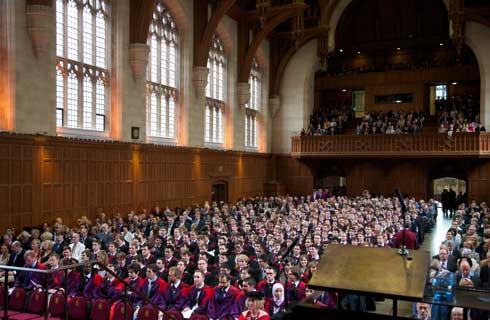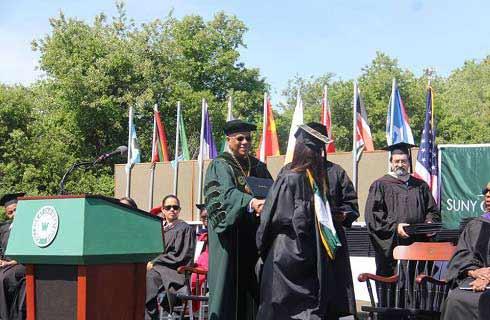Master of Science in Environmental Engineering

学历文凭
Masters Degree

专业院系
环境工程学

开学时间

课程时长

课程学费

国际学生入学条件
To be granted admission to the MS. in Environmental Engineering degree program at Tandon School of Engineering, an applicant should holds a B.S. degree in a related engineering discipline (e.g., environmental, civil, chemical, mechanical, etc.) from an accredited college in the United States or a recognized institution of higher learning abroad and has attained an undergraduate grade point average (GPA) of at least 3.0/4.0. Students holding B.S. degrees in another engineering discipline, or a physical, chemical or biological science, may be admitted if they have achieved the technical background necessary to pursue advanced work in Environmental Engineering.
To be eligible for consideration to any graduate program at NYU Tandon, you must hold a four-year U.S. Bachelor's degree from a regionally accredited U.S. institution, or its international equivalent.
The minimum GPA requirement is a 3.0 out of a 4.0 scale.
Official Transcripts and Degree Conferral (Proof of Degree)
Personal Essay
R'sum
IELTS Academic - overall band of 7.0
TOEFL iBT - 90
Duolingo English Test - 125
To be eligible for consideration to any graduate program at NYU Tandon, you must hold a four-year U.S. Bachelor's degree from a regionally accredited U.S. institution, or its international equivalent.
The minimum GPA requirement is a 3.0 out of a 4.0 scale.
Official Transcripts and Degree Conferral (Proof of Degree)
Personal Essay
R'sum
IELTS Academic - overall band of 7.0
TOEFL iBT - 90
Duolingo English Test - 125
IDP—雅思考试联合主办方

雅思考试总分
7.0
了解更多
- 雅思总分:7
- 托福网考总分:90
- 托福笔试总分:160
- 其他语言考试:Pearson PTE Academics - 65
CRICOS代码:
申请截止日期:请 与IDP联系 以获取详细信息。
课程简介
Environmental Engineering is a diverse field that focuses on the sustainable use and preservation of natural resources anthropogenic interactions in an increasingly urbanized world. It is a career field in high demand and it was recently ranked as the fifth most valuable college major (Forbes, May 2012). At the School of Engineering, our program has an urban environmental systems emphasis and it is unique in concentrating on many challenges that New York City and major cities of the world face.<br><br>The MS in Environmental Engineering prepares graduates to plan, functionally design, control, operate and manage municipal and industrial pollution-prevention systems. Students are exposed to a learning atmosphere that provides a mix of theory and practical problem-solving approaches. The flexible course options and student research projects offer a variety of opportunities. Areas of research and scholarly activities supported by some of the best faculty in NYC include environmental systems management, monitoring, sensing, and visualization, water security, flood risk management, conflict resolution, river water quality modeling, groundwater modeling, solid and hazardous waste management, contamination remediation, climate change studies, and development of decision support systems and GIS based applications.
相关申请

预科

奖学金

实习机会

在校学习

跨境学习

校园授课-线上开始

在线/远程学习
本校相关课程
Advanced Certificate in Transportation Planning

学历文凭
Graduate Certificate
下一个开始日期
课程费用总额
Advanced Certificate in Traffic Engineering

学历文凭
Graduate Certificate
下一个开始日期
课程费用总额
Advanced Certificate in Construction Management

学历文凭
Graduate Certificate
下一个开始日期
课程费用总额
Doctor of Philosophy in Transportation Systems

学历文凭
Ph.D.
下一个开始日期
课程费用总额
Doctor of Philosophy in Mechanical Engineering

学历文凭
Ph.D.
下一个开始日期
课程费用总额
Doctor of Philosophy in Materials Chemistry

学历文凭
Ph.D.
下一个开始日期
课程费用总额
其他相关课程
环境工程应用科学学士学位

滑铁卢大学
泰晤士高等教育世界大学排名:

学历文凭
Bachelor Degree
下一个开始日期
课程费用总额
环境工程应用科学硕士

达尔豪斯大学
泰晤士高等教育世界大学排名:

学历文凭
Masters Degree
下一个开始日期
课程费用总额
环境工程学硕士

达尔豪斯大学
泰晤士高等教育世界大学排名:

学历文凭
Masters Degree
下一个开始日期
课程费用总额
环境工程技术文凭

萨省理工学院
泰晤士高等教育世界大学排名:

学历文凭
Bachelor Degree
下一个开始日期
课程费用总额
替代能源技术文凭

北阿尔伯塔理工学院
泰晤士高等教育世界大学排名:

学历文凭
Bachelor Degree
下一个开始日期
课程费用总额
环境工程学硕士

渥太华大学
泰晤士高等教育世界大学排名:188

学历文凭
Masters Degree
下一个开始日期
课程费用总额





